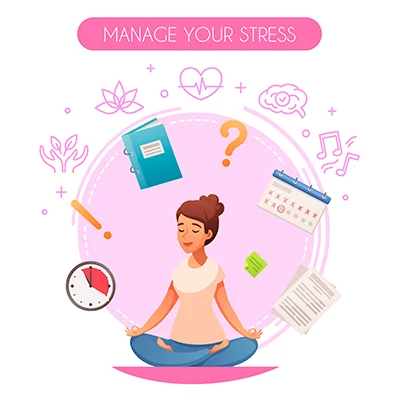Stress Symptoms Causes & Prevention Stress: is a complex physiological and psychological response to external or internal pressures or challenges, often referred to as stressors. It is a natural and adaptive reaction that occurs in individuals when they perceive a threat, demand, or change that exceeds their ability to cope effectively.
Stress can manifest in various forms, including physical, emotional, and cognitive symptoms. These symptoms can range from increased heart rate, muscle tension, and shallow breathing to feelings of anxiety, irritability, and difficulty concentrating. Stress can also have both short-term (acute) and long-term (chronic) effects on a person’s health and well-being.
While some level of stress is a normal part of life and can motivate individuals to perform better in challenging situations, excessive or chronic stress can be detrimental to physical and mental health. It has been associated with a wide range of health problems, including cardiovascular disease, digestive issues, depression, anxiety disorders, and more.
Managing stress effectively is essential for maintaining overall well-being. Strategies for stress management often include relaxation techniques, exercise, mindfulness, time management, seeking social support, and making lifestyle changes to reduce stressors. Professional help from therapists or counselors may also be necessary for individuals dealing with chronic or severe stress.
Types of Stress
Stress can be categorized into several types based on different factors, including its duration, source, and impact on an individual.
Here are some common types of stress:
- Acute Stress:
– Acute stress is short-term and typically occurs in response to a specific event or situation, often referred to as a “stressor.” It is a natural reaction to immediate threats or challenges. Examples of acute stressors include taking an important exam, facing a job interview, or encountering a sudden dangerous situation. - Chronic Stress:
– Chronic stress is long-term and persists over an extended period, often due to ongoing or recurring stressors. It can result from factors such as a demanding job, financial difficulties, or ongoing family conflicts. Chronic stress can have a cumulative and harmful effect on both physical and mental health. - Episodic Acute Stress:
– Some individuals experience frequent episodes of acute stress due to their tendency to encounter multiple stressors or their inability to manage stress effectively. This pattern of episodic acute stress can lead to chronic stress if left unaddressed. - Environmental Stress:
– Environmental stress refers to stressors arising from external factors such as noise pollution, overcrowding, or exposure to natural disasters. These stressors can affect individuals living in high-stress environments. - Work-Related Stress:
– Work-related stress, also known as occupational stress, occurs as a result of pressures and demands in the workplace. It can stem from factors like heavy workloads, long hours, job insecurity, conflicts with colleagues or supervisors, and unrealistic expectations. - Home and Family Stress:
– Stress can arise from challenges within the family and home environment, such as marital problems, parenting issues, financial difficulties, or caregiving responsibilities. Balancing work and family responsibilities can also contribute to this type of stress. - Post-Traumatic Stress:
– Post-traumatic stress disorder (PTSD) is a specific type of stress that occurs in response to a traumatic event. It can affect individuals who have experienced or witnessed a life-threatening or highly distressing event, leading to symptoms like flashbacks, nightmares, and severe anxiety. - Physiological Stress:
– Physiological stress is the body’s response to physical stressors, such as illness, injury, or surgery. It can include the body’s natural reaction to pain, inflammation, or infection. - Psychological Stress:
– Psychological stress primarily involves cognitive and emotional responses to stressors. This type of stress can result from factors like excessive worry, anxiety, and emotional trauma. - Social Stress:
– Social stress stems from challenges in interpersonal relationships, including peer pressure, social isolation, discrimination, or bullying. It can impact an individual’s sense of belonging and self-esteem.
It’s important to note that these types of stress are not mutually exclusive, and individuals may experience a combination of stressors simultaneously. Additionally, the way people respond to and cope with stress can vary widely from person to person. Effective stress management techniques and seeking support when needed can help individuals better deal with the various types of stress they encounter.
Symptoms of Stress
Stress can manifest in a variety of physical, emotional, cognitive, and behavioral symptoms. These symptoms can vary in intensity and duration depending on the individual and the level of stress they are experiencing.
Here are common symptoms of stress:
Physical Symptoms:
- Muscle Tension: Stress can lead to increased muscle tension, often resulting in muscle aches, headaches, and body pain.
- Fatigue: Chronic stress can cause persistent fatigue and a feeling of low energy.
- Sleep Problems: Stress can disrupt sleep patterns, leading to difficulties falling asleep, staying asleep, or experiencing restorative sleep.
- Gastrointestinal Issues: Stress can contribute to digestive problems, including stomachaches, indigestion, and irritable bowel syndrome (IBS).
- Increased Heart Rate: The body’s “fight or flight” response to stress can lead to a rapid heartbeat and palpitations.
- Shallow Breathing: Stress may cause shallow or rapid breathing, leading to a feeling of breathlessness or hyperventilation.
- Changes in Appetite: Stress can affect appetite, leading to overeating or loss of appetite, which may result in weight gain or loss.
Emotional Symptoms:
- Anxiety: Anxiety is a common emotional response to stress, characterized by excessive worry, restlessness, and a sense of impending doom.
- Irritability: Stress can make individuals more irritable, short-tempered, and easily frustrated.
- Depression: Prolonged stress can contribute to feelings of sadness, hopelessness, and even clinical depression.
- Mood Swings: Stress can lead to unpredictable mood swings, making it difficult to manage emotions effectively.
- Feeling Overwhelmed: Chronic stress can create a sense of being overwhelmed, where individuals feel unable to cope with life’s demands.
Cognitive Symptoms:
- Difficulty Concentrating: Stress can impair concentration, memory, and the ability to make decisions.
- Racing Thoughts: Stress can lead to a racing mind with intrusive or obsessive thoughts.
- Forgetfulness: Stress may cause forgetfulness and difficulty recalling details or information.
- Negative Thinking: Stress can contribute to negative thought patterns and a pessimistic outlook on life.
Behavioral Symptoms:
- Changes in Eating and Sleeping Habits: Stress can lead to changes in eating and sleeping patterns, including overeating or not eating enough and insomnia or oversleeping.
- Social Withdrawal: Some individuals may withdraw from social activities and isolate themselves when experiencing stress.
- Increased Substance Use: People may turn to substances like alcohol or drugs as a way to cope with stress.
- Procrastination: Stress can lead to procrastination and difficulty initiating tasks or meeting deadlines.
- Nail Biting, Hair Twisting, or Other Nervous Habits: Some individuals develop nervous habits as a response to stress.
It’s important to note that not everyone experiences stress in the same way, and the symptoms can vary widely from person to person. Additionally, experiencing occasional stress is a normal part of life. However, chronic or excessive stress can have detrimental effects on both physical and mental health. If you or someone you know is struggling with persistent or severe stress symptoms, it’s advisable to seek support from a healthcare professional or mental health therapist to develop effective coping strategies and address underlying causes of stress.
Causes of Stress
Stress can be triggered by a wide range of factors, known as stressors, which can vary from person to person. These stressors can be external or internal and may be physical, emotional, psychological, or environmental in nature.
Here are some common causes of stress:
- Work-related Stress:
– Heavy workloads, tight deadlines, and high job demands.
– Job insecurity, the fear of losing one’s job, or concerns about career advancement.
– Workplace conflicts, difficult colleagues or supervisors. - Financial Stress:
– Money problems, including debt, financial instability, or unexpected expenses.
– Concerns about retirement savings or financial planning. - Relationship and Family Stress:
– Marital conflicts, separation, or divorce.
– Parenting challenges, including the demands of raising children.
– Caregiver stress when caring for aging parents or ill family members. - Health-related Stress:
– Illness or injury, whether personal or in a loved one.
– Chronic health conditions that require ongoing management.
– Health-related concerns or worries about one’s own well-being. - Life Transitions:
– Major life changes such as moving, starting a new job, getting married, or having a child.
– Grief and loss, including the death of a loved one. - Academic Stress:
– Pressure from academic expectations, exams, and assignments.
– The transition to a new school or educational institution. - Environmental Stress:
– Exposure to environmental stressors such as noise pollution, pollution, or natural disasters.
– Crowded or uncomfortable living conditions. - Social Stress:
– Social isolation or loneliness.
– Peer pressure, especially during adolescence.
– Discrimination and prejudice, including racial, gender, or LGBTQ+ discrimination. - Time Pressure:
– Feeling rushed or overwhelmed due to a lack of time to complete tasks or meet commitments. - Technology and Information Overload:
– Constant connectivity and the demands of technology, including excessive emails, notifications, and social media. - Traumatic Events:
– Exposure to traumatic events such as accidents, violence, or natural disasters can lead to acute stress reactions or post-traumatic stress disorder (PTSD). - Personal Expectations and Perfectionism:
– Setting unrealistic standards for oneself and the fear of not meeting personal or societal expectations. - Uncertainty and Change:
– Fear of the unknown and resistance to change can be sources of stress for many people. - Stressful Thought Patterns:
– Persistent negative thinking, rumination, or catastrophic thoughts can exacerbate stress.
It’s important to recognize that not all stress is harmful; in fact, some level of stress can be motivating and adaptive. However, chronic or excessive stress can have negative effects on physical and mental health. Effective stress management involves identifying the specific stressors in one’s life and developing strategies to cope with them. This may include relaxation techniques, time management, seeking social support, and, in some cases, professional help from therapists or counselors.

Prevention of Stress
While it may not be possible to completely eliminate all sources of stress from your life, you can take proactive steps to prevent and reduce stress. Prevention involves adopting healthy lifestyle choices, effective coping strategies, and making changes to your daily routine.
Here are some ways to prevent stress:
- Time Management:
– Organize your tasks and prioritize them to reduce the feeling of being overwhelmed.
– Create to-do lists and set achievable goals.
– Avoid overcommitting yourself; learn to say no when necessary. - Healthy Lifestyle Choices:
– Get regular exercise: Physical activity helps reduce stress hormones and promotes the release of endorphins, which are natural mood lifters.
– Maintain a balanced diet: Eating nutritious foods can have a positive impact on your overall well-being and stress resilience.
– Get adequate sleep: Aim for 7-9 hours of quality sleep each night to support your body’s stress recovery mechanisms.
– Limit caffeine and alcohol intake, as these substances can contribute to stress and anxiety. - Mindfulness and Relaxation:
– Practice mindfulness meditation, deep breathing exercises, or progressive muscle relaxation to calm your mind and reduce stress.
– Engage in activities that promote relaxation, such as reading, taking warm baths, or listening to soothing music. - Social Support:
– Maintain strong social connections with friends and family members who provide emotional support.
– Share your thoughts and feelings with trusted individuals, as talking about your stressors can be therapeutic. - Boundaries and Assertiveness:
– Set clear boundaries in your personal and professional life to protect your time and energy.
– Learn assertiveness skills to communicate your needs effectively and avoid unnecessary stressors. - Work-Life Balance:
– Strive to maintain a healthy balance between work and personal life.
– Take regular breaks during the workday to recharge and prevent burnout. - Problem-Solving Skills:
– Develop problem-solving skills to address challenges and stressors effectively.
– Break down complex problems into smaller, manageable steps. - Positive Thinking and Self-Compassion:
– Cultivate a positive outlook by challenging negative thought patterns and practicing self-compassion.
– Avoid perfectionism and unrealistic self-expectations. - Hobbies and Leisure Activities:
– Engage in hobbies and activities you enjoy to provide an outlet for relaxation and creativity. - Seek Professional Help:
– If stress becomes overwhelming or chronic, consider seeking support from a mental health professional, such as a therapist or counselor. - Time for Self-Care:
– Allocate time for self-care activities that promote relaxation and well-being, such as reading, art, or spending time in nature. - Limit Exposure to Stressors:
– Identify sources of chronic stress in your life and take steps to minimize or eliminate them if possible.
Remember that prevention is an ongoing process, and what works for one person may not work for another. It’s essential to customize your stress prevention strategies to fit your unique circumstances and needs. By adopting a combination of healthy habits and stress management techniques, you can significantly reduce the impact of stress on your life and improve your overall well-being.
How does stress affect us?
Stress can have a profound impact on our physical, emotional, cognitive, and behavioral well-being. While some stress is a normal and adaptive response to challenges, chronic or excessive stress can be detrimental to our health and quality of life.
Here’s how stress can affect us:
Physical Effects:
- Cardiovascular System: Stress triggers the “fight or flight” response, causing the release of stress hormones like cortisol and adrenaline. These hormones can increase heart rate and blood pressure, which, over time, can contribute to heart problems, hypertension, and an increased risk of cardiovascular diseases.
- Muscle Tension: Stress can lead to muscle tension and stiffness, resulting in headaches, neck and back pain, and other musculoskeletal issues.
- Immune System: Chronic stress weakens the immune system, making individuals more susceptible to infections and illnesses.
- Gastrointestinal Problems: Stress can disrupt digestion, leading to issues like indigestion, irritable bowel syndrome (IBS), and other digestive disorders.
- Sleep Disturbances: Stress often causes sleep problems, including insomnia, restless sleep, and frequent awakenings, which can further exacerbate health issues.
- Weight Fluctuations: Some people respond to stress by overeating or undereating, which can lead to weight gain or loss.
Emotional and Psychological Effects:
- Anxiety and Depression: Chronic stress is a common trigger for anxiety disorders and depression. It can lead to excessive worry, fear, and a persistent sense of sadness or hopelessness.
- Mood Swings: Stress can cause rapid and unpredictable shifts in mood, leading to irritability, anger, and frustration.
- Cognitive Impairment: Stress can impair cognitive function, making it difficult to concentrate, remember information, and make decisions.
- Decreased Self-Esteem: Prolonged stress can erode self-confidence and self-esteem, contributing to negative self-perception.
- Increased Risk of Mental Health Disorders: Persistent stress can increase the risk of developing various mental health conditions, including post-traumatic stress disorder (PTSD), panic disorder, and generalized anxiety disorder.
Cognitive Effects:
- Difficulty Concentrating: Stress can make it challenging to focus on tasks and think clearly, affecting productivity and decision-making.
- Memory Problems: Chronic stress can impair both short-term and long-term memory, making it harder to recall information.
- Rumination: Stress can lead to repetitive and negative thinking patterns, causing individuals to dwell on problems without finding solutions.
Behavioral Effects:
- Changes in Eating Habits: Stress can lead to overeating or undereating, potentially resulting in weight gain or loss.
- Substance Abuse: Some people turn to alcohol, drugs, or other substances as a way to cope with stress, leading to addiction issues.
- Procrastination: Stress can contribute to procrastination and difficulty initiating tasks or meeting deadlines.
- Social Withdrawal: Individuals experiencing high levels of stress may withdraw from social activities and isolate themselves from friends and family.
- Aggression and Conflict: Stress can increase irritability and aggressiveness, potentially leading to conflicts with others.
It’s important to note that individuals respond to stress differently, and the severity of stress-related symptoms can vary widely. Recognizing the signs of stress and implementing effective stress management techniques, such as relaxation, mindfulness, and seeking support from friends or mental health professionals, can help mitigate its negative effects. Chronic stress should be taken seriously, as it can have a significant impact on long-term health and well-being, and seeking professional help may be necessary in some cases.
How to avoid stress?
While it’s not always possible to completely avoid stress, you can take proactive steps to reduce and manage it effectively.
Here are some strategies to help you avoid stress or minimize its impact on your life:
- Practice Stress Awareness:
– Start by recognizing your stressors and understanding what triggers stress in your life. Awareness is the first step in managing stress effectively. - Set Realistic Expectations:
– Avoid setting unrealistically high standards for yourself or others. Recognize that perfection is not attainable, and it’s okay to make mistakes. - Prioritize Time Management:
– Organize your time effectively by creating to-do lists and prioritizing tasks. Break larger tasks into smaller, manageable steps to reduce feelings of overwhelm. - Establish Boundaries:
– Set clear boundaries in your personal and professional life. Learn to say no when necessary to protect your time and energy. - Maintain a Healthy Lifestyle:
– Engage in regular physical activity, eat a balanced diet, and get sufficient sleep. These habits help build physical and emotional resilience to stress. - Practice Relaxation Techniques:
– Incorporate relaxation techniques such as deep breathing exercises, mindfulness meditation, or progressive muscle relaxation into your daily routine. - Seek Social Support:
– Maintain strong social connections with friends and family who can provide emotional support and companionship during stressful times. - Limit Exposure to Stressors:
– Identify and minimize chronic stressors in your life when possible. This might involve making lifestyle changes or seeking solutions to ongoing problems. - Practice Positive Thinking:
– Challenge negative thought patterns and replace them with more positive and realistic thoughts. Cultivate a positive outlook on life. - Time for Self-Care:
– Allocate time for self-care activities that promote relaxation and well-being, such as reading, taking baths, or pursuing hobbies you enjoy. - Effective Communication:
– Learn and practice effective communication skills to express your needs and concerns clearly and assertively, reducing misunderstandings and conflicts. - Plan and Prepare:
– When facing significant life events or changes, such as moving or starting a new job, plan and prepare as much as possible in advance to reduce uncertainties and stress. - Practice Mindfulness:
– Mindfulness involves staying in the present moment and accepting it without judgment. This practice can help reduce stress by allowing you to focus on what you can control in the here and now. - Professional Help:
– If stress becomes overwhelming or unmanageable, consider seeking support from a mental health professional, such as a therapist or counselor. They can provide guidance and strategies for dealing with stress effectively. - Take Breaks and Rest:
– Make sure to take regular breaks during the day, especially when working or studying. Rest and relaxation are essential for maintaining your mental and emotional well-being. - Avoid Overcommitment:
– Be mindful of your commitments and avoid taking on too many responsibilities. Overcommitting can lead to chronic stress.
Remember that stress is a natural part of life, and some stress can be motivating and adaptive. It’s essential to develop a toolbox of stress management techniques that work best for you and to tailor your approach to your unique circumstances. By incorporating these strategies into your daily life, you can better avoid, reduce, and cope with stress effectively.
Iodine Deficiency: Symptoms, Causes, & Home Remedies
Insomnia: Types, Symptoms, Causes & Prevention
Sore Throat, Symptoms, Causes, Prevention & Home Remedies
Dandruff: Types, Symptoms, Causes & Prevention
Dark Circles Under Eyes: Symptoms, Remedies & Prevention
Heart Attack: Types, Symptoms & Prevention
Eye Infections: Symptoms, Causes & Treatment
Vertigo: Causes, Symptoms, Treatment & Preventive
Hair Loss, Types, Symptoms, Prevention & Treatments
Knee Pain, Symptoms, Types & Self Management
If you don’t like this article/post please share your feedback





